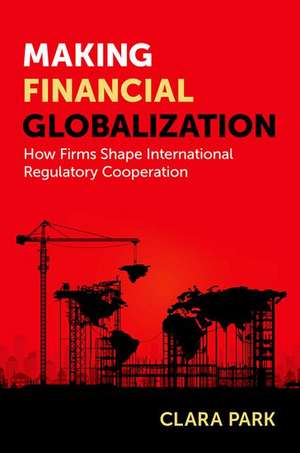Making Financial Globalization: How Firms Shape International Regulatory Cooperation
Autor Clara Parken Limba Engleză Paperback – 13 ian 2025
| Toate formatele și edițiile | Preț | Express |
|---|---|---|
| Paperback (1) | 132.01 lei 10-16 zile | +52.89 lei 4-10 zile |
| Oxford University Press – 13 ian 2025 | 132.01 lei 10-16 zile | +52.89 lei 4-10 zile |
| Hardback (1) | 407.83 lei 10-16 zile | |
| Oxford University Press – 29 dec 2024 | 407.83 lei 10-16 zile |
Preț: 132.01 lei
Preț vechi: 171.99 lei
-23% Nou
Puncte Express: 198
Preț estimativ în valută:
25.27€ • 27.46$ • 21.24£
25.27€ • 27.46$ • 21.24£
Carte disponibilă
Livrare economică 20-26 martie
Livrare express 14-20 martie pentru 62.88 lei
Preluare comenzi: 021 569.72.76
Specificații
ISBN-13: 9780197761823
ISBN-10: 0197761828
Pagini: 184
Ilustrații: 24 b/w figures
Dimensiuni: 157 x 235 x 13 mm
Greutate: 0.24 kg
Editura: Oxford University Press
Colecția OUP USA
Locul publicării:New York, United States
ISBN-10: 0197761828
Pagini: 184
Ilustrații: 24 b/w figures
Dimensiuni: 157 x 235 x 13 mm
Greutate: 0.24 kg
Editura: Oxford University Press
Colecția OUP USA
Locul publicării:New York, United States
Recenzii
To many today it may seem that a global financial market is the normal and natural state of things. Clara Park reminds us that financial globalization was made in the decades after 1990, and that it was made by self-interested private financial institutions. Before then, finance was largely national and often state-controlled. But international financial institutions worked together to change both national and international policies. They spurred regulatory changes at the national level, and the creation of multilateral agreements, that created the contemporary globally integrated financial order. With theoretical and empirical clarity, Park shows the private-sector origins of the cutting edge of modern globalization.
Park's Making Financial Globalization is an important addition to financial globalization research. Noteworthy is her emphasis on global financial firms as pivotal in shaping the international financial framework. Another highlight is her shift towards scrutinizing financial current account regulation, rather than capital account regulation, in the global governance of finance. Additionally, her creation of two extensive databases on financial trade restrictions and regulations will greatly benefit scholars. This work stands as a remarkable contribution from an emerging scholar.
Park's Making Financial Globalization is an important addition to financial globalization research. Noteworthy is her emphasis on global financial firms as pivotal in shaping the international financial framework. Another highlight is her shift towards scrutinizing financial current account regulation, rather than capital account regulation, in the global governance of finance. Additionally, her creation of two extensive databases on financial trade restrictions and regulations will greatly benefit scholars. This work stands as a remarkable contribution from an emerging scholar.
Notă biografică
Clara Park is an assistant professor at the University of Colorado and a research fellow at Duke University. She received a Ph.D. in Political Science from the University of California, Berkeley, and a B.A. in Economics and Government from Cornell University. She was a project director at the Berkeley APEC Study Center and a Postdoctoral Research Associate at Duke University.
